Intimate doesn’t really do justice to the experience of a sold-out gig downstairs at Green Note; it’s way beyond cosy with an audience of twenty-five. In an ideal world Sam Lewis would be playing a bigger room, but sometimes you have to work with what you have. Fortunately, everyone in the audience has come particularly to see Sam tonight, so we can just relax into a great live experience. On Sam’s latest album, “Waiting on You”, he’s backed by the cream of Nashville’s studio musicians, but this is a solo acoustic gig, and the songs and voice stand or fall on merit alone. I’m not going for the suspense thing here, I’ll tell you straight; this man has a phenomenal voice and his songs are multi-faceted gems.
Sam’s voice and songwriting fall into an intersection between soul, blues and country that doesn’t see too many visitors, but that isn’t the only thing to make him stand out. His laid-back stoner stage persona creates an immediate bond with the small audience before he’s even sung or played a note and generates a rapport that strengthens as the gig goes on.
Maybe it’s a reference to the heat in the venue (it’s a bit like having thirty people in your living room) but the opening song is an interesting one; it’s John Prine’s “Mexican Home”. Once the tuning issues caused by the heat are out of the way, Sam enchants the audience with two sets that include songs from “Waiting on You”, including “Things Will Never be the Same” (written in the UK last year, apparently), “Little Time”, “Virginia Avenue”, “3/4 Time”, “Reinventing the Blues”, “Waiting on You”, a superb “Never Again” and a mix of covers and earlier material.
Sam’s digressions between songs have a tendency towards the surreal and work perfectly to dissolve any barriers there may be between performer and audience; on the surface it looks shambolic, but it’s a hugely effective approach. Towards the end of his first set he talks about the impact that Fred Eaglesmith has had on his writing, playing the wonderful “Bluesday Night” from his debut album as an example of Fred’s influence, which he follows with the heart-rending “The Rocket” from Fred’s 2003 album “Balin”; it’s one of many perfect moments during the set.
After the encore of “The Cross I Wear”, it’s all over and Sam Lewis found some new fans, including a group celebrating a birthday; that’s the kind of birthday party I would go to every time. It’s too late to see Sam Lewis on this tour, but watch out for him next year. Meanwhile I think you ought to have a listen to “Sam Lewis”, “Waiting on You” or both to start the weekend.
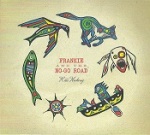 Concept album? Well. I’m not quite sure that’s an adequate description for Rita Hosking’s sixth studio album, “Frankie and the No-Go Road”. You can just take it at face value as a collection of twelve beautifully-crafted songs, delivered with stripped-back folk/Americana arrangements and a striking, sometimes fragile but always impassioned, voice; it’s all of those things but it’s much more as well. The album takes the popular mythological theme of the questing hero and weaves this through the fabric of our journey through life while interleaving mystical and mythological references from various cultures. Each of the songs has a subtitle relating to the progress of the mythological hero, Frankie (whose gender isn’t specified) through their heroic quest.
Concept album? Well. I’m not quite sure that’s an adequate description for Rita Hosking’s sixth studio album, “Frankie and the No-Go Road”. You can just take it at face value as a collection of twelve beautifully-crafted songs, delivered with stripped-back folk/Americana arrangements and a striking, sometimes fragile but always impassioned, voice; it’s all of those things but it’s much more as well. The album takes the popular mythological theme of the questing hero and weaves this through the fabric of our journey through life while interleaving mystical and mythological references from various cultures. Each of the songs has a subtitle relating to the progress of the mythological hero, Frankie (whose gender isn’t specified) through their heroic quest.
But before we go any further, let’s hear it for the guys in the band; Rich Brotherton (playing virtually everything plus production and backing vocals), Glen Fukunaga (upright bass), Don Wynn (drums, percussion), Sean Feder (dobro, djembe), Kora Feder (harmony vocals) and Andy Lentz (violin) supply masterfully understated backing for Rita’s guitars, banjo, harmonica and vocals, creating an understated soundscape that evokes “Harvest” and “After the Goldrush” and perhaps the austerity of Springsteen’s “Nebraska”.
The opening songs “A Better Day” and “Wetiko” set the scene for the album; “A Better Day” is a delicate exposition, gently identifying a malaise in the writer’s life and creating the link with fictional hero Frankie. Rita’s voice, with a hint of vibrato, and the mournful harmonica create an aura of melancholy which is crying out for resolution. “Wetiko” identifies the malaise with the Native American concept of a parasitic psychosis, devouring the individual from within, relying on a sparse banjo/drums/bass arrangement to evoke menace and malice. As the album progresses the two narrative strands are woven ever tighter with episodes of denial (“Magic Carpet”) and resolve (“I See Storms”) before the quest reaches its crisis.
“Black Hole”, with its hints at a support group meeting and “Mama Said” reveal that the demons are within and always have been. The telling image is that of a dog dying of thirst but afraid to drink because of his reflection in the water in “Mama Said”; once that fear is overcome by a leap of faith, then the journey becomes easier. The quest continues with the hazardous journey home, challenges to the outcomes, and a sharing of the lessons learned in “Sing” which finally reunites the two narrative strands with a simple solution; put your faith in the natural world and express yourself freely.
“Frankie and the No-Go Road” is a fascinating and haunting piece of work; the instrumentation is sparse and the vocals powerful, yet simultaneously vulnerable, pulling us in to two narratives linking the inner and outer worlds. It’s an ambitious concept, but the deliberate musical understatement and complexity of the narratives and themes create a tremendously satisfying album which occupies the mind long after the last notes fade away.
“Frankie and the No-Go Road” is released in the UK on Friday October 30th.
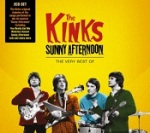 You’re probably asking the very same question that I asked; what’s the point of another Kinks Kompilation? There are hundreds (of varying quality) out there already, so why would we need another one? The inner cynic says that it’s the run-up to Christmas and it’s a handy present for older relatives (the ones who still own CD players), but that’s a bit unfair because there is at least a rationale behind this release, and that’s a tie-in with the incredibly successful musical “Sunny Afternoon”, which is still running in the West End (go and see it if you get the chance; it’s great fun).
You’re probably asking the very same question that I asked; what’s the point of another Kinks Kompilation? There are hundreds (of varying quality) out there already, so why would we need another one? The inner cynic says that it’s the run-up to Christmas and it’s a handy present for older relatives (the ones who still own CD players), but that’s a bit unfair because there is at least a rationale behind this release, and that’s a tie-in with the incredibly successful musical “Sunny Afternoon”, which is still running in the West End (go and see it if you get the chance; it’s great fun).
This track listing of the compilation imitates the running order of the stage show until partway through the second disc, where things start to get a little unfocussed. There’s a section of ten songs which have been chosen by Ray Davies to add to the selection, followed by some interview snippets and the obligatory BBC sessions; it’s a bit of a mixed bag really.
The idea of following the show’s running order demonstrates the development of The Kinks and Ray Davies’ songwriting. The first three songs are completely forgettable sub-Merseybeat, and it’s not until the music hall-influenced “Denmark Street” that the Kinks truly original and particularly English character emerges, starting a run of twenty-five truly great songs any real music fan should have in their collection.
The ten songs chosen by Ray Davies come from a variety of sources including the albums “Arthur”, “Kinda Kinks”, “Are the Village Green Preservation Society” and even the soundtrack for the film “Percy”; they cover the period 1965 to 1972 and give an indication of the breadth of Ray Davies’ songwriting and the fact that there’s a lot of very good Kinks material out there that most people haven’t heard. The interview clips are fairly standard innocuous stuff used to introduce BBC recordings of “You Really Got Me”, “Tired of Waiting for You” and the Dave Davies classic, “Death of a Clown”.
The overall impression of this package is that someone saw an opportunity to tie in with the stage show but wanted to make it a double CD package without having enough material for two discs. If you don’t own any Kinks albums, this isn’t a bad introduction but it’s a little haphazard once you get past “Lola” on side two.
Out now on Sanctuary Records (KINKSTVCD001).
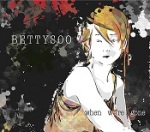 Sometimes you just have to marvel at the resilience of songwriters and artists as you wonder how they can take utterly chaotic and sometimes tragic lives and create works of outstanding beauty from it. BettySoo has put this album together over a five year period spent dealing with things that would leave most of us beaten into submission, but she’s taken inspiration from even the most difficult of these situations and turned it into an album full of variety, pathos and even hints of joy. The most potent songs in this collection are the snapshots of people in difficult and sometimes impossible social circumstances trying to find a way to make it to the next day or next period of calm.
Sometimes you just have to marvel at the resilience of songwriters and artists as you wonder how they can take utterly chaotic and sometimes tragic lives and create works of outstanding beauty from it. BettySoo has put this album together over a five year period spent dealing with things that would leave most of us beaten into submission, but she’s taken inspiration from even the most difficult of these situations and turned it into an album full of variety, pathos and even hints of joy. The most potent songs in this collection are the snapshots of people in difficult and sometimes impossible social circumstances trying to find a way to make it to the next day or next period of calm.
The core musicians supporting her on “When We’re Gone” are Brian Standefer (whose lugubrious cello permeates almost the entire album), Glenn Fukunaga (bass) and Dave Terry and Rick Richards (drums and percussion), but it’s not a full-on band sound; everything is used sparingly to create delicate textures for some tender and fractured tales of society’s outsiders and to leave lots of space for BettySoo’s pure, clear tones (maybe somewhere between Early Joni Mitchell and Suzanne Vega).
I could write at great length about all of the songs on the album, but we’re on a deadline here, so I’m just picking out a few of the many great songs here to give you a flavour of “When We’re Gone”. “Josephine” is a classic piece of songwriter misdirection; the first verse leads you into the seemingly familiar territory of the unfaithful husband arriving home with telltale lipstick signs, but the subject switches dramatically when you realise that his secret life is as a cross-dressing torch singer. It still manages to be a sad song of fleetingly-fulfilled potential, despite the relief we feel that the central character isn’t cheating in the conventional way. “The Things She Left Town With” is the story of a woman who has escaped from her past to an uncertain future of financial insecurity and substance abuse and the power of the song is in telling the story without imposing any interpretation; this is just the way it is.
The disintegrating relationship in “Hold Tight” is described in a series of escalating armaments images as it moves towards its goal of mutually assured destruction and it’s a clever extended metaphor, but it’s no academic exercise, there’s a genuine power and pathos in the imagery of lines like ‘When love shatters, shards, fragments fly everywhere’. And that leaves the most powerful song on the album, the bleak and harrowing “Nothing Heals a Broken Heart”.
There’s no misdirection here, the first line of the song tells you that this is about something more than a bit of infedility. The song deals with the death of a child and the reactions of people around the bereaved mother and it’s uncompromising but not judgemental; the platitudes of the onlookers are exposed but not criticised. The ultimate message is that you come to terms with your continuing life, but the broken heart never heals. This must have been an incredibly difficult song to write and even more difficult to perform but you can’t listen to this and remain unmoved. It’s a remarkable achievement.
“When We’re Gone” is out on October 30th.
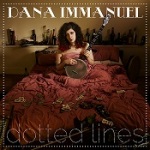 I have to admit it; when a press release describes the artist as “banjo-toting, whiskey-drinking, poker-playing singer-songwriter currently operating from a north London hideout” it does grab your attention. With those influences, you wouldn’t expect an album full of moonin’ and Junin’ lyrics and you wouldn’t be wrong. Dana Immanuel’s second album, “Dotted Lines”, is a fascinating mixture of lyrical invention, painful honesty some psychedelic production and arrangements pulling elements in from her varied and interesting background to create eight songs that give us a sometimes disturbing insight into her life. That’s right, only eight songs, but none of them make me reach for the skip button, so I don’t have a problem with that.
I have to admit it; when a press release describes the artist as “banjo-toting, whiskey-drinking, poker-playing singer-songwriter currently operating from a north London hideout” it does grab your attention. With those influences, you wouldn’t expect an album full of moonin’ and Junin’ lyrics and you wouldn’t be wrong. Dana Immanuel’s second album, “Dotted Lines”, is a fascinating mixture of lyrical invention, painful honesty some psychedelic production and arrangements pulling elements in from her varied and interesting background to create eight songs that give us a sometimes disturbing insight into her life. That’s right, only eight songs, but none of them make me reach for the skip button, so I don’t have a problem with that.
The album’s opener and title track tells you immediately that we’re not in Kansas any more; there’s banjo, distorted slide guitar, breaking bottles and reversed sounds as a framework for a story of metaphorically disrespected boundaries. It’s part Americana, part psychedelia and part musique concrete and it’s not often I get the chance to say that. The musical invention is present throughout the album, from the thunderous bass and reversed backing vocals of “Rock Bottom” to the military beat and massed counterpoint of “Going to the Bottle” and there’s verbal dexterity in the lyrics as well (how about ‘It’s not my primary intention to find chemical redemption’) although there’s always a fine line between smart and too much, which the album just about stays on the right side of.
The two slower songs towards the end of the album stand out as more personal, dealing surprisingly gently with an artistic groupie (“Life in Colour”) and the need to be completely selfish in order to succeed in the music business (“Be like Arnie”) using fiddle and trumpet respectively for some additional colour. There are references to gambling, drinking and failed relationships throughout the album (not surprisingly given Dana’s background) but there’s also “Mile High”, an interesting take on the life of airline cabin crew. It’s certainly an interesting mix and it’s not an album that permits boredom because there’s always something new around the corner. The songs may be strong meat, but Dana’s pure, and sometimes delicate, voice rounds away some of the sharp edges creating bitter-sweet vignettes.
Out on Friday 16th October.
 There’s only one band I’ve seen more often than I’ve seen Squeeze (answers in the comments box if you think you know who that is) and one of the interesting things they have in common is that they don’t have a precious attitude about the recorded versions of their songs. Chris Difford and Glenn Tilbrook have always been willing to try new arrangements; I must have heard half a dozen different versions of “Goodbye Girl” over the years and I never heard one I didn’t like. On this tour, Squeeze is basically Glenn’s band The Fluffers plus Melvin Duffy and they all play on the new album “Cradle to the Grave”; each member brings their own particular contribution to the overall sound. Simon Hanson is the archetypal drummer, full of energy and charisma, while his rhythm section partner, Lucy Shaw, dominates the right side of the stage with electric bass, double bass, ukulele and backing vocals. Stephen Large adds keyboards (including accordion and melodica) and Melvin Duffy plays just about anything with strings, including pedal steel and Weissenborn guitar. They’re all wonderful players (and singers) and add layer upon layer of instruments and vocals to the live sound.
There’s only one band I’ve seen more often than I’ve seen Squeeze (answers in the comments box if you think you know who that is) and one of the interesting things they have in common is that they don’t have a precious attitude about the recorded versions of their songs. Chris Difford and Glenn Tilbrook have always been willing to try new arrangements; I must have heard half a dozen different versions of “Goodbye Girl” over the years and I never heard one I didn’t like. On this tour, Squeeze is basically Glenn’s band The Fluffers plus Melvin Duffy and they all play on the new album “Cradle to the Grave”; each member brings their own particular contribution to the overall sound. Simon Hanson is the archetypal drummer, full of energy and charisma, while his rhythm section partner, Lucy Shaw, dominates the right side of the stage with electric bass, double bass, ukulele and backing vocals. Stephen Large adds keyboards (including accordion and melodica) and Melvin Duffy plays just about anything with strings, including pedal steel and Weissenborn guitar. They’re all wonderful players (and singers) and add layer upon layer of instruments and vocals to the live sound.
But what about Dr John Cooper Clarke as support? Well, he’s promoting his new album “Anthologia” and the idea of supporting a band’s nothing new; he did it hundreds of times during the punk era. Nearly forty years on, it still works; there are no musical rivalries between bands to worry about and JCC’s mix of manic recital and laconic links and gags is a perfect way to warm up for the Squeeze hometown gig. The old favourites are there, “Beasley Street”, “Evidently Chickentown” and “Twat” (including verses which weren’t in the original) as well as newer material like “Beasley Boulevard” dealing with the gentrification of inner cities. There’s more chat between poems than in the past and it’s usually hilarious, offering a novel and skewed perspective on everyday life. There’s the occasional stumble in the motormouth delivery, but that’s forgivable and he leaves the audience well and truly ready for the main event.
After an intro from Danny Baker, the set begins with Glenn Tilbrook wandering on stage while playing some intro music which morphs into “Hourglass”, with one of the catchiest of many catchy Squeeze hooks. As you might expect from two people with the experience of Glenn Tilbrook and Chris Difford, the set is perfectly paced, seamlessly weaving three-quarters of the new album in with the old classics and a few surprises. There’s a double hit of nostalgia on this tour as well, because the “Cradle to the Grave” material is set in the early seventies and a few of the songs are already familiar to the audience.
The quality of the band and the range of instruments they play allows for an incredibly varied set musically and visually; everyone sings and they’re able to vary the dynamics of the set by having the entire band along the front of the stage (and even into the audience) a couple of times for a more intimate acoustic feel. The performances are all absolutely spot on but there’s a hugely contagious enthusiasm at play as well. Everyone on stage is having a great time, and who wouldn’t, working your way through some of the finest pop songs ever written. There’s even a couple of non-originals too; The Tom T Hall classic “Harper Valley PTA” gets an energetic run through while Chris takes a lead vocal on a laconic version of Tom Waits’ “I Don’t Wanna Grow Up”. As for the hits, “Hourglass”, “Is That Love?”, “Another Nail in my Heart”, “Tempted”, “Pulling Mussels from the Shell” and “Up the Junction” are all fairly close to the originals while an intimate hits section in the middle of the set has a zydeco version of “Slap and Tickle”, an acoustic version of “Goodbye Girl” with congas, and stripped back acoustic version of “Black Coffee In Bed”.
Hearing those catchy, inventive melodies and clever but under-stated lyrics again is a reminder of the importance of this band to a whole generation in the UK, evoking a time when life wasn’t necessarily better but it was a lot simpler and the soundtrack was superb. You still have five chances to see them on the UK leg of their tour and “Cradle to the Grave” is available now as well. This might just be the time to re-acquaint yourself with two of British pop’s finest writers.
And here’s a coincidence; the only band that I’ve seen more times than Squeeze has two members who are big fans of Chris and Glenn. Who could they be?
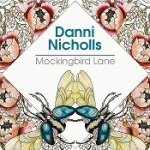 Do you ever have that feeling that you should really like an album because everyone else likes it, but you can’t seem to grasp why it’s so popular? That’s the way I feel about this album. Before anyone gets offended, I have to say there isn’t a bad song on the album, the musicians are some of Nashville’s finest (including Chris Donohue, Bryan Owings, Will Kimbrough and Stephen Leiweke) and Danni Nicholls is rated very highly by many country performers and insiders, but my buttons remain defiantly unpressed. I’m not even saying I don’t like “Mockingbird Lane”; I think the problem for me is that everything sounds just a little bit too refined, a little bit too well-polished with no rough edges or sharp corners to offer a contrast to the smooth balance of the album. Across all eleven tracks, absolutely nothing jars but, equally, nothing grabs my attention and forces me to listen.
Do you ever have that feeling that you should really like an album because everyone else likes it, but you can’t seem to grasp why it’s so popular? That’s the way I feel about this album. Before anyone gets offended, I have to say there isn’t a bad song on the album, the musicians are some of Nashville’s finest (including Chris Donohue, Bryan Owings, Will Kimbrough and Stephen Leiweke) and Danni Nicholls is rated very highly by many country performers and insiders, but my buttons remain defiantly unpressed. I’m not even saying I don’t like “Mockingbird Lane”; I think the problem for me is that everything sounds just a little bit too refined, a little bit too well-polished with no rough edges or sharp corners to offer a contrast to the smooth balance of the album. Across all eleven tracks, absolutely nothing jars but, equally, nothing grabs my attention and forces me to listen.
Seven of the eleven songs on the album are co-writes with a variety of other artists and maybe what’s happening is that Danni’s originality is being pressed (knowingly or not) into a Nashville pop format by her collaborators. Of the four solo writes, the opener “Long Road Home” with the theme of going back home after originally running away and “Leaving Tennessee”, with some tasteful finger-picked guitars and mandola, feel more personal than the rest of the album while “Sad Swan” uses a metaphor of a cygnet on the river before its time to represent someone who isn’t ready for a relationship. These songs feel like there’s genuine Danni DNA in there, and that’s not something you can say for the rest of the album.
There are a couple of songs that pretty much sum up my reaction to the album and one of them is “Back to Memphis”. There’s some lovely piano on the track, but there’s a line ‘Want to hear a song where the words don’t rhyme’ which you wish had been applied occasionally; a non-rhyme or an unexpected rhyme or an unusual metaphor occasionally would have made such a difference. Just the title of “Beautifully Broken” is illustrative; broken, but with a few missing pieces or ragged edges might pique the interest a little more than the pristine country pop served up here.
There’s a lot to like about this album, but not really enough to love; true, it’s only Danni Nicholls’ second album and I’m looking forward to hearing what the future holds. Her voice is already superb and when the material truly matches the voice, she will be a formidable force.
“Mockingbird Lane” is out on October 23rd on Danni Nicholls Music (DNM001).
I was just drinking my cocoa and keeping up with all the modern trends in music by watching Jools Holland’s “Later” programme last night when I saw something so disturbing that I almost wrote to “Points of View”. On stage, straight after the wonderful Burt Bacharach, were two badly-dressed Northerners with a stolen laptop balanced on a beer barrel and a beer crate ranting, swearing and shouting over the top of what I think they call ‘beats’ these days. My first reaction was (I’ve been dying to try this out) ‘WTF?’ That actually felt quite good, swearing without really swearing. It might just catch on.
Sorry, bit distracted there. The more I watched, the more horrified I became. Why on earth did Mr Holland have two ill-dressed extras from “This is England” on his show ranting and drinking beer (which is very unprofessional on stage, I must say) alongside his usual smorgasbord of high quality modern musicians? At least the Happy Mondays played proper instruments and had something resembling tunes.
So it must be some kind of performance art then or some elaborate joke. Was it a pair of drama students satirising the quality of modern pop music by creating something so obnoxious and unmusical that it was totally unlistenable and then setting out to see how many people they could con. Or maybe it was the media; someone saw an absolutely terrible pair of hip-hop or post-punk, or whatever they are, performers and decided to play the ‘Emperor’s new clothes’ game; tell them how good they are and then build them up in the music press. If you do that for long enough, one of the inkies will pick up the story and bearded Hoxton types will be saying how they loved their earlier work. Amazingly enough, they’ve been doing this for eight years, apparently. The NME does this sort of thing all the time; how do you think Pete Doherty got away with it for so long.
And talking about the NME, what on earth happened to that? I had one thrust into my hand at the railway station the other day; it’s free these days, so I thought I’d check which giants of modern music they were featuring. There was a piece on drug cartels that could have been researched using Wikipedia and the “Ladybird Book of Crack and Cocaine”, the famous music journalist Katherine Ryan (really) writing about Piggate and MeghanTrainor and a six-page plug for the resurrection of Chis Moyles. Just remember that NME used to stand for New Musical Express and this is someone who can get away with playing three songs in an hour. There was once a time when the NME had writers who were vicious, opinionated, clannish and supercilious but at least it was worth reading; I don’t think those days are ever coming back.
But what about Sleaford Mods, you say? They’re not from Sleaford and I’m sure Mr Weller wouldn’t approve of their version of mod couture and they still look like the people I pass every morning waiting for the off-licence to open. I wonder what that lovely Mr Bacharach made of it?
By the way does anyone know of a good product for cleaning cocoa stains off a carpet?
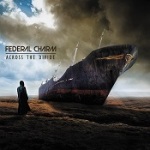 Difficult second album? Not having that; this is Federal Charm we’re talking about here and this is just another step on the way on the way to blues/rock domination. It’s been over two years since the debut album and they haven’t wasted that time. They’ve toured on their own and as support for the likes of Ian Hunter and Rich Robinson, working on the songs at their own pace between tours until they were confident that everything was ready to go. It’s a lot like the live performances; it’s not about pyrotechnics or twenty-minute guitar solos, it’s about four very good musicians playing a bunch of well-crafted songs. The confidence in their own abilities shines through without coming over as the cocksure arrogance of some lesser bands; they don’t need that kind of ego trip. But what about the album?
Difficult second album? Not having that; this is Federal Charm we’re talking about here and this is just another step on the way on the way to blues/rock domination. It’s been over two years since the debut album and they haven’t wasted that time. They’ve toured on their own and as support for the likes of Ian Hunter and Rich Robinson, working on the songs at their own pace between tours until they were confident that everything was ready to go. It’s a lot like the live performances; it’s not about pyrotechnics or twenty-minute guitar solos, it’s about four very good musicians playing a bunch of well-crafted songs. The confidence in their own abilities shines through without coming over as the cocksure arrogance of some lesser bands; they don’t need that kind of ego trip. But what about the album?
Well, the opening song on “Across the Divide”, “Master Plan”, gives a pretty good idea of what the album’s about. It powers in with a mighty guitar riff but this is a long way away from leaden-footed four to the floor dad rock. Even within the first song there are twists and turns, breakdowns and full range of dynamics. And it’s not just about the two guys upfront with the guitars; LD Morawski’s bass and Danny Rigg’s drums play a vital part in the overall sound, as the drummer deals with shifting rhythms and the bass is used as a third guitar, contributing melodic parts (“Silhouette”) rather than the thudding root note we hear way too often.
The big guitar riffs are all there, from the opening chord riff of “Guess What” to the riff and melody combination of the lead track “Hercules”, the wah-wah psychedelia of “No More” and the toppy, choppy riff of the funky “Push” (with the lead vocal sounding a lot like Glenn Tilbrook), Nick Bowden and Paul Bowe’s guitars form constantly shifting patterns under Nick’s stunning vocals. Federal Charm sound just as convincing with the slower songs; “These Four Walls” is a powerful break-up song and the album’s closer, “Walk Away (Time & Time Again)” works its way up through the gears towards a solo which sounds like vintage Brian Robertson before fading out on a piano coda.
“Across the Divide” confirms the impression created by the debut album; these guys have all the ability and all the songs plus the confidence to get out there and deliver where it really counts. They’re currently on the road with Joanne Shaw Taylor before setting out on their own headline tour; get out and see them, you won’t regret it.
“Across the Divide” is out now on Wire-Sound (WIRED 35).



